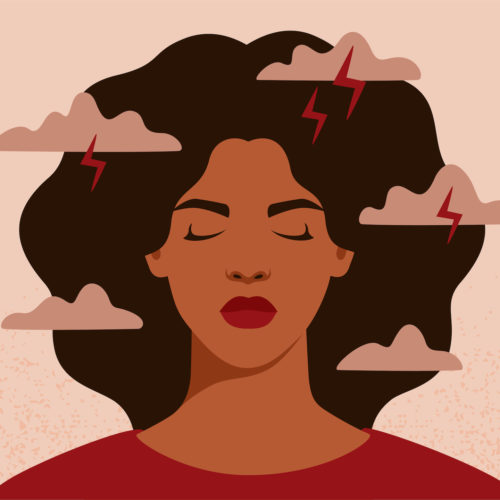No, schizophrenics aren’t dangerous, those with anxiety disorders aren’t over-reacting, those with depression aren’t seeking attention and having OCD means way more than wanting things neat and orderly. Here are common misconceptions about mental health everyone should know.
We’ve been more upfront about mental health now more than ever, being more open towards our coworkers, partners, friends or family members. But though the public discourse is a good thing, we ask, have we actually got things wrong about mental health? Are we belittling mental health illnesses by making them the “norm”?
TV shows are also doing their part to highlight that it’s not always rainbows and butterflies, but do people with anxiety and depression actually socially withdraw themselves, always sit with a straight face and push away people? No. I struggle with anxiety on a daily basis and I probably seem like one of the happiest people on the outside. Mental health and psychological disorders have a lot of grey area and they paint a different picture for everyone. Here are some common mental health misconceptions and myths – don’t worry if you’ve got yourself tangled up, we’re all here to be more compassionate!
Read More: 6 Facts Worth Knowing About Depression

 Mental Health Problems Are A Sign Of Weakness
Mental Health Problems Are A Sign Of Weakness
This may possibly be one of the biggest myths and misconceptions surrounding mental health that irritates all that struggle with a mental health disorder. People deem us as weak, both mentally and physically.
If you were more thick-skinned, you wouldn’t be dealing with mental health issues!
I remember when my parents thought my anxiety was at an all-time high because I wasn’t eating properly. According to them, my poor diet was making me weak. While gut health and mental health are linked, my diet was definitely not the major factor affecting my mental health. What we want people to know is, it actually takes a great deal of strength to not let our mental health get the worst of us. And we pride ourselves with this badge of honour that we did get out of bed, we did pull through work and we simply did what we thought was impossible.
 Eating Disorders Are A Lifestyle Choice
Eating Disorders Are A Lifestyle Choice
Not a lot of people openly discuss eating disorders, so it’s no surprise that there are a range of misconceptions and myths surrounding the issue. No one refuses a meal or deliberately pukes out their food. It is not a choice. It’s an urge driven by a series of compulsive thoughts that one cannot control, so yes those with eating disorders are too struggling with a mental health disorder.
 Anti-Depressants And Medications Won’t Work Unless You Do
Anti-Depressants And Medications Won’t Work Unless You Do
There’s a bit of stigma revolving around anti-depressants and medications that treat mental health, as well as amongst those not taking them and also amongst those taking them. In fact, I myself thought that their “effectiveness” was due to me putting in the effort. Nope. There’s a reason why they are prescribed and they do work. There’s no harm and there’s nothing wrong with taking anti-depressants if they are what you need to function day-to-day.
Editor’s Note: Please seek a medical professional for guidance on anti-depressants and medications.
Read More: 12 Apps For Meditation, Mindfulness & Mental Health

 If We Look Okay On The Outside, We Must Be Okay On The Inside Too
If We Look Okay On The Outside, We Must Be Okay On The Inside Too
As I’ve said, I’m quite the expert in hiding my anxiety and depression. But I’m just one of many who have mastered this skill. Even if we’re feeling queasy, sweaty and basically a nervous-wreck on the inside, others wouldn’t have a clue. But that doesn’t leave room for assumptions.
You had a panic attack? But you looked totally fine just a while ago!
Mainstream shows almost always portray characters struggling with mental health issues as distant, dressed in all black (everyone loves black!) and sets them apart in every way possible. But in reality, those struggling with mental health are out socialising and smiling, dressed to impress (themselves) and everything looks natural. Just be kind to others, because no one knows what the other person is dealing with on the inside.

 Seeking Help Is Only For People With Severe Mental Health Illnesses
Seeking Help Is Only For People With Severe Mental Health Illnesses
When I first started seeing my psychiatrist, my parents weren’t happy with it. One, because it’s very expensive and two because they thought I would eventually get well without any help. Here’s the catch, seeking mental help or seeing a therapist is totally healthy for everyone. You don’t need to be diagnosed with a disorder to see a mental health professional. Much like how you’d go for a general check-up to see how you’re physically doing, it’s also good to check how you’re mentally doing.
I used to think I was a mentally strong person, I blamed every physical symptom on my diet and when I finally got diagnosed with a mental health disorder, it was eye-opener. It made so much sense. If anything, keeping your mental health in check regularly reaps many benefits (we just wish it was more accessible).
 Having Mental Health Issues Or Illness Means You Lack Intelligence
Having Mental Health Issues Or Illness Means You Lack Intelligence
Education is in no way related to your mental health! The myth comes from those struggling with anxiety being more quiet in school, which is the case for some, myself included. Many of us are simply too afraid of criticism and judgement so we remain quiet. Some of my high school friends, classmates and even teachers would think I was an underachiever because of how quiet I was.
Instead of calling us “shy”, notice the body language – we’re nervous to speak up and do not blame us for it.
Read More: 5 Ways To Overcome Mind Traps & Stay Motivated
 Thinking It’s More Psychological Than Physical
Thinking It’s More Psychological Than Physical
Isn’t this a classic one!
It’s all in your head, honey!
Mental health isn’t just mental. There’s trembling, heart palpitations, muscle weakness, shortness of breath, excessive sweating, bowel issues, digestive issues… the list goes on! There are numerous physical symptoms and it’s very helpful for everyone to know these are caused by a deteriorating mental health. When I had my first panic attack, I thought it was a heart attack, that’s how physical it is!
Of course, there are a handful of mental symptoms that are, well, a handful, so yes, we are dealing with a lot and let’s remind ourselves each time to be considerate, empathic and kind to one and other and mean it when we say, “I’m here for you.”
Read More: 8 Habits To Improve Your Mental Health
Main image courtesy of Getty, image 1 courtesy of Priscilla Du Preez via Unsplash, image 2 courtesy of Simon Maage via Unsplash, image 3 courtesy of Priscilla Du Preez via Unsplash.





 Eat & Drink
Eat & Drink



 Travel
Travel



 Style
Style



 Beauty
Beauty



 Health & Wellness
Health & Wellness



 Home & Decor
Home & Decor



 Lifestyle
Lifestyle


 Weddings
Weddings




